Good night - we'll be backpublished at 19:15 BST 2 April 2015
That's it for today on the BBC Africa Live page. Download the Africa Today podcast and visit BBCAfrica.com for the latest news on the siege in Kenya.
Al-Shabab gunmen storm Kenyan university
At least 70 dead and 79 injured
Unknown number of hostages seized
500 students rescued
Garissa university, 150km from Somali border, sealed off
Lucy Fleming, Clare Spencer and Farouk Chothia
That's it for today on the BBC Africa Live page. Download the Africa Today podcast and visit BBCAfrica.com for the latest news on the siege in Kenya.
The BBC's Thomas Amter has just sent this photo of emergency workers in Garissa.
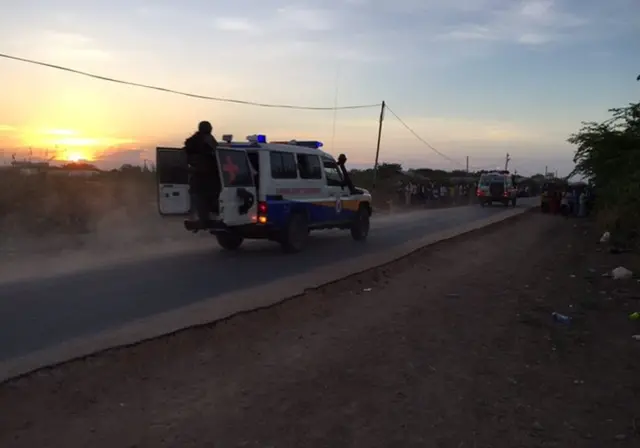
The Kenyan government say this is the man behind the Garissa University College attack:
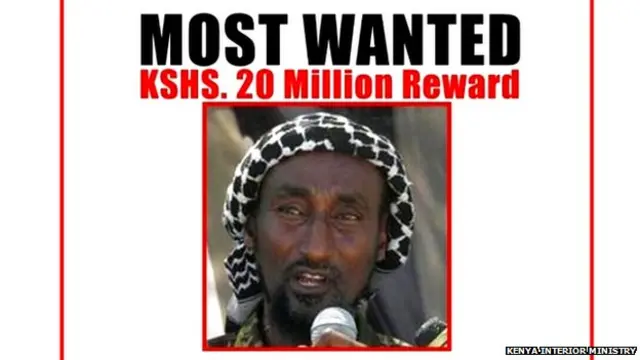 Image source, Kenya Interior Ministry
Image source, Kenya Interior MinistryThey've put a $215,000 (£145,000) reward for his capture.
Mohamed Kuno has several aliases but is best known as Mohamed Dulyadin, which means ambidextrous in the Somali language.
BBC News looks at how he rose up the ranks of al-Shabab.
BBC Somali analyst Abdullahi Abdi has been speaking to residents of Garissa. They have been telling him the attack is similar to the 2013 Westgate shopping mall siege, and it shows the government has not learnt anything. Residents are also wondering why there were only two guards on duty when the militants stormed the university, despite warnings of an attack.
The gunmen in Garissa in Kenya have been isolated by the security forces in the female dormitories:
Here's a map of the scene of the siege:
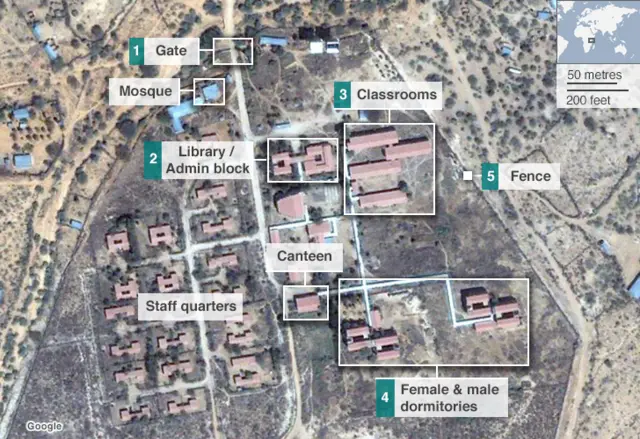
1. Militants enter the university grounds, two guards are shot dead
2. Shooting begins within the campus
3. Students attacked in their classrooms while preparing for exams
4. Gunmen believed isolated in the female dormitories
5. Some students make an escape through the fence
 Anne Soy
Anne Soy
BBC Africa, Garissa
Body bags are being brought into a plane. It's a very dramatic scene considering it is about 15 hours since the start of the attack at Garissa University College.
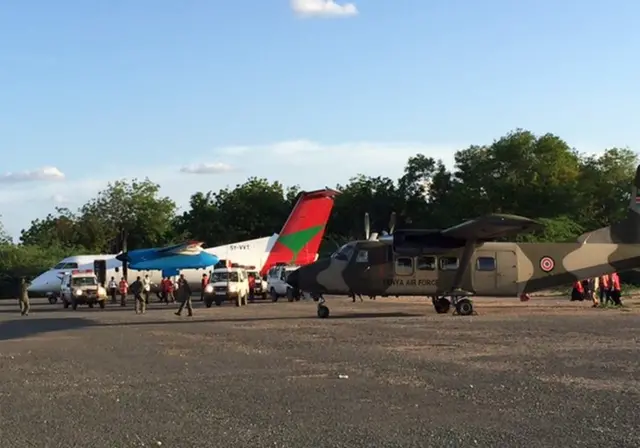
A woman is helped in Garissa after escaping from a building at the university.
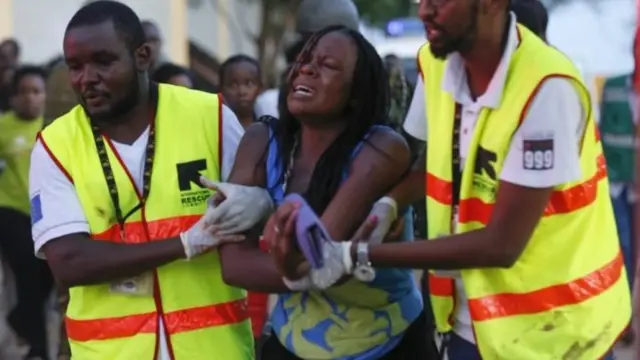 Image source, EPA
Image source, EPAThis is the phone call that changed Nigeria:
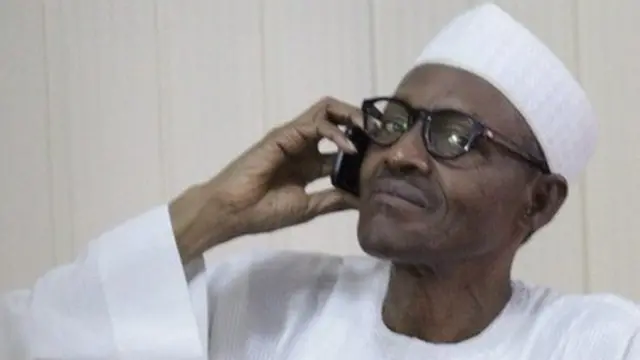 Image source, Red Media africa
Image source, Red Media africaPresident Goodluck Jonathan is congratulating Gen Muhammadu Buhari on winning the country's election.
But the call almost didn't happen. The editor of the BBC Hausa service Mansur Liman says Mr Jonathan couldn't get through to Gen Buhari so he sent a messenger round to his house to tell him to pick up his phone.
Kenya Red Cross tweets, external:
"#GarissaAttack Update: Aircraft carrying 20 bodies has landed at #Wilson from #Garissa. Bodies being transported to #ChiromoMortuary".
Mary Harper
BBC News
What started as a largely Somali movement has become a regional one, with growing numbers of Kenyan recruits. Al-Shabab has recently released propaganda videos aimed at a Kenyan audience. There are also unconfirmed reports that it is considering switching allegiance to Islamic State in order to remain relevant.
This is hurting tourism. Just last week, the UK's Foreign Office updated its travel advice, warning British citizens against all but essential travel to eastern Kenya and most of the coast.
Mary Harper
BBC News
Al-Shabab says it attacked Garissa University College because it is at war with Kenya. In October 2011, Kenyan troops entered Somalia in an effort to stop the Islamists from crossing the long, porous border between the two countries and kidnapping people. But their presence achieved the opposite effect, provoking al-Shabab to increase its activity in Kenya.
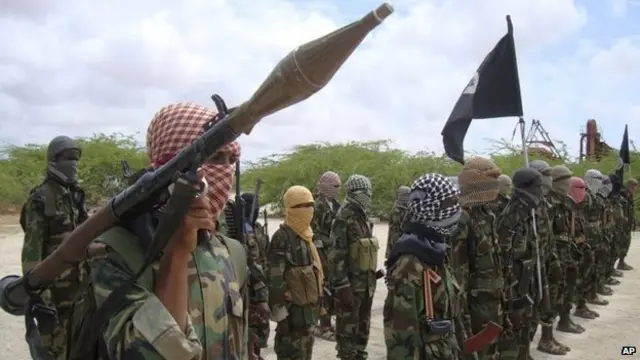 Image source, AP
Image source, APAl-Shabab killed 67 people when its heavily armed fighters attacked the Westgate shopping centre in the Kenyan capital, Nairobi, a year-and-a-half ago. Originally based in Somalia, it has killed dozens more since then in its pursuit of a hardline Islamic law.
Lebo Diseko, external is in the chair on Focus on Africa TV at 17:30 GMT.
She'll be getting the latest update of the Garissa University College attacks with Anne Soy, external live in north-eastern Kenya and security analysis from Nairobi.
And of course, we're showing Peter Okwoche's, external full interview with Nigeria's President-elect Gen Buhari, external.
Watch it on BBC World TV.
As the death toll rises to 70, some photos are coming through of the Garissa University college siege.
Here Kenyan soldiers take cover near the perimeter wall of the campus.
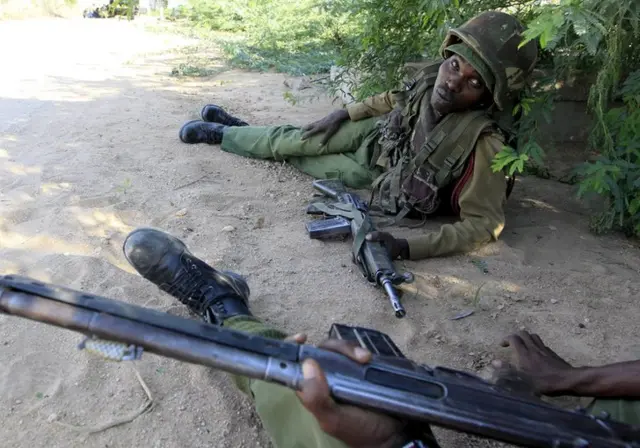 Image source, Reuters
Image source, ReutersMeanwhile, a Kenyan soldier stops a boy from moving in the direction of the siege.
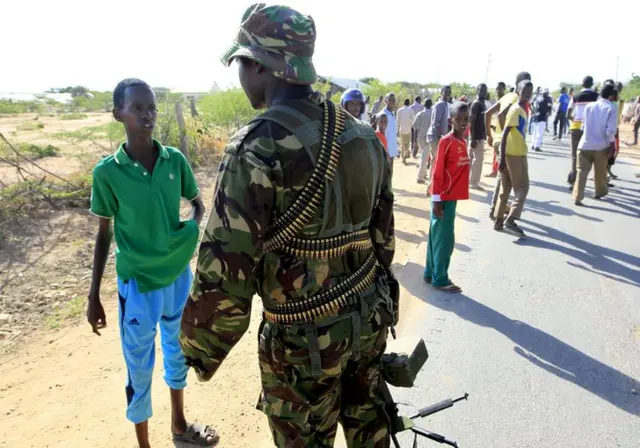 Image source, NOOR KHAMIS
Image source, NOOR KHAMISKenya's government has tweeted, external: "500 students rescued, 70 dead among them 4 terrorists #OneKenya voa CS @InteriorKE"
Here's another tweet, external from the Kenya National Disaster Operation Centre on the latest in Garissa: "9 critically injured from the #GarissaAttack have been airlifted from Garissa Airbase to Nairobi for treatment."
The Kenya National Disaster Operation Centre tweets, external: "Inspector General @JBoinnet issue a curfew order from 6:30pm to 6:30am in Tana River, Garisa, Wajir and Mandera counties until 16 April".
The Kenya National Disaster Operation Centre tweets, external: "UPDATE: 70 fatalities, 79 injured, over 500 students rescued from the Garissa University College campus. Operations still ongoing."
Kenyan-based journalist Hannah McNeish tweets, external: "As the light fades in #Kenya, horrible deja vus of #Westgate imagining how hostages much be feeling trapped in #Garissa University dorm."
BBC Africa correspondent Andrew Harding ruminates over what Nigerian opposition leader Muhammadu Buhari's victory in the presidential election means for Africa. He warns not to get over-excited by the result and argues it was no people's revolution, just a subtler change to an entrenched autocracy.
Soldiers are pictured in position around the perimeter wall of Garissa University College.
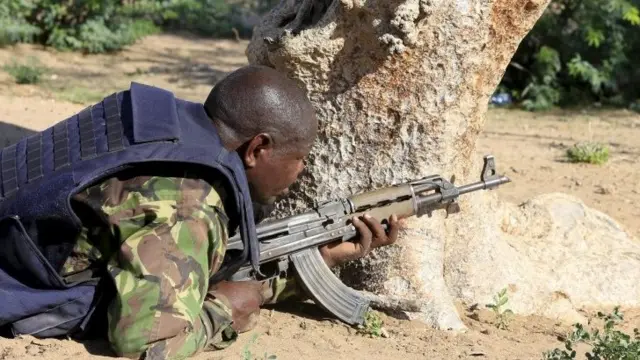 Image source, Reuters
Image source, Reuters